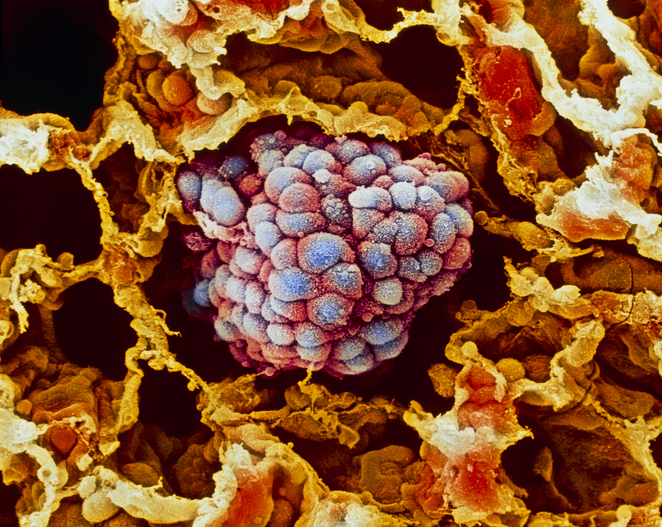
One for liquid biopsies, another for tissue biopsies. That’s the tack Pharma giant Amgen is taking with its dual announcements this week detailing new partnerships with Guardant Health and Qiagen related to develop a liquid biopsy companion diagnostic (CDx) and a tissue based CDx, respectively, for its investigational cancer treatment AMG 510 to identify patients with cancers that have the KRAS G12C mutation.
The deals with each partner will initially focus on the KRAS G12C mutation as found in non-small cell lung cancer (NSCLC) which accounts for approximately 13% of all NSCLC cases. Development efforts for Guardant will leverage the company’s Guardant360 CDx as a blood-based test, while Qiagen will apply its therascreen test to develop a tissue-based CDx.
“We believe that the development of Guardant360 CDx will lead to consistently delivered guideline-complete genotyping results along with other important genomic information to patients and their providers through blood, which will ultimately increase the number of patients who are identified as eligible for targeted therapies, including AMG 510, and thus improve access to these potentially life-changing treatments,” noted AmirAli Talasaz, Ph.D., president, Guardant Health in a press release.
According to the company, since its launch in 2014, Guardant360 has had a foothold in all 27 National Comprehensive Cancer Network (NCCN) Centers and has been used by more than 5,000 oncologists in that time. The test covers all genes recommended for profiling by NCCN, including the 73 genes most relevant to clinical care.
Under the agreement with Amgen, Guardant Health will pursue the U.S. Food and Drug Administration (FDA) Pre-Market Approval, Japan Pharmaceutical and Medical Device Agency Approval, and European CE-Mark for Guardant360 CDx as a companion diagnostic for AMG 510 in metastatic non-small cell lung cancer (NSCLC) patients with the KRAS G12C mutation.
With Qiagen, the deal to develop a tissue-based CDx for the indication builds on an existing relationship between the two companies. For AMG 510, Qiagen will use its therascreen test to identify KRAS G12C mutations initially for NSCLC, though the deal allows for expansion into other clinical development program for oncology in the future.
Qiagen’s Sample to Insight workflows and experience in developing diagnostic solutions for precision medicine are well-suited to help aid in evaluating patients with non-small cell lung cancer,” said Thierry Bernard, interim CEO of Qiagen and senior vice president, head of the Molecular Diagnostics Business Area. “The success of our long-standing collaboration with Amgen is a demonstration of QIAGEN’s capabilities as a preferred partner of pharmaceutical and biotech companies for the creation of companion diagnostics.”
AMG 510 is a small molecule inhibitor of KRASG12C currently being investigated as a treatment for a variety of solid tumors with KRAS G12C mutation and is the first inhibitor to advance to the clinic.
Its activity was first reported last fall in the journal Nature in the paper titled “The Clinical KRASG12C Inhibitor AMG 510 Drives Anti-Tumor Immunity.” The paper details the novel structural insights that led to the discovery of AMG 510, the preclinical evidence of AMG 510 activity, its potential ability to induce tumor-cell killing as both a monotherapy and in combination with other therapies, and its impact on the immune system that may render tumor cells particularly sensitive to immunotherapy.
According to an Amgen press release announcing the publication, researchers first identified the novel histidine 95 (H95) groove located on an inactive KRASG12C protein. Leveraging its compound screening and structure-based design capabilities, AMG 510 emerged as the top investigational candidate from the optimization of a series of H95 groove-binding molecules. The small molecule is “designed to irreversibly bind to KRASG12C protein and permanently lock it in an inactive state, leading to inhibition of tumor cell growth in KRASG12C driven tumors,” a company press release stated.
Securing the CDx partners is an important first step to moving AMG 510 down the path to an approved drug. Amgen is current enrolling patients in what could be a registration Phase II study and the FDA has also granted Orphan Drug Designation to AMG 510 for previously treated metastatic NSCLC and colorectal cancer with KRAS G12C mutation as well as a Fast Track Designation for previously treated metastatic NSCLC with KRAS G12C mutation.
“The potential of AMG 510 to specifically target KRAS G12C, a mutation that was once thought to be undruggable, represents a major therapeutic advancement in advanced non-small cell lung cancer,” said Sanket Agrawal, general manager of the KRAS program at Amgen. “Amgen is committed to driving broad accessibility to biomarker testing.”











